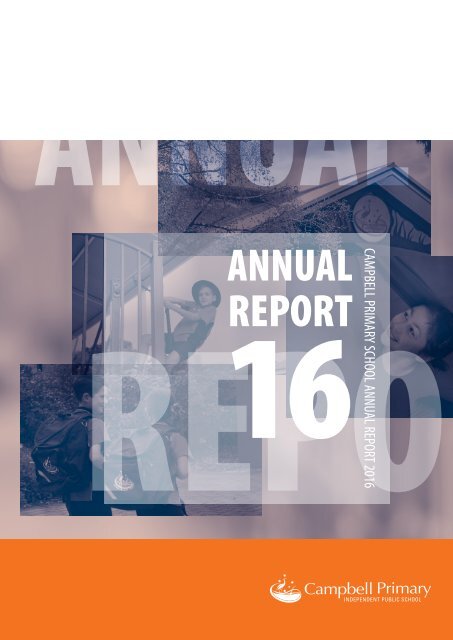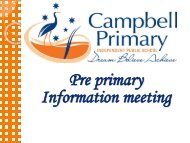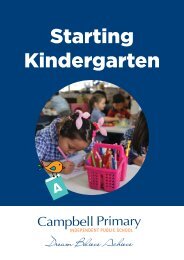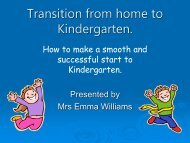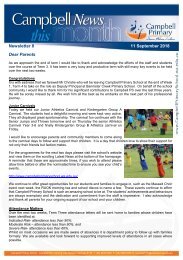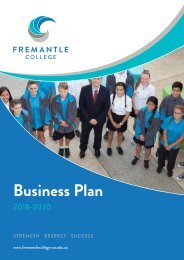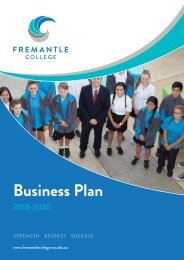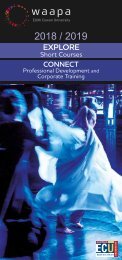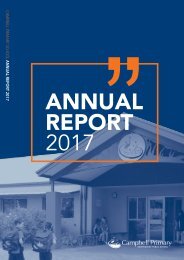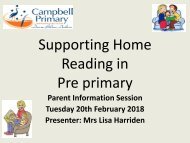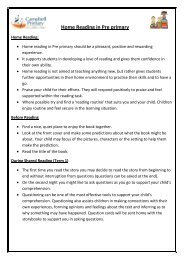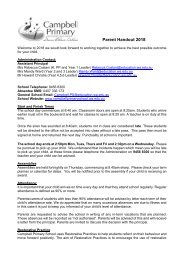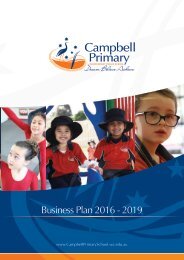CP4192 ANNUAL REPORT 2016_lowres_final
You also want an ePaper? Increase the reach of your titles
YUMPU automatically turns print PDFs into web optimized ePapers that Google loves.
<strong>ANNUAL</strong><br />
<strong>ANNUAL</strong><br />
<strong>REPORT</strong><br />
REPOR 16<br />
CAMPBELL PRIMARY SCHOOL <strong>ANNUAL</strong> <strong>REPORT</strong> <strong>2016</strong>
<strong>2016</strong> CAMPBELL PRIMARY<br />
SCHOOL <strong>ANNUAL</strong> <strong>REPORT</strong><br />
Contents<br />
4 Principal’s Report<br />
8 Student Engagement<br />
12 Learning Area - Numeracy<br />
14 Learning Area - Literacy<br />
18 Learning Area - Humanities<br />
& Social Sciences<br />
19 Specialist Areas<br />
24 Partnerships With Parents<br />
Parent, Staff and Student Survey Information
<strong>2016</strong> Campbell Primary School Annual Report<br />
PRINCIPAL’S <strong>REPORT</strong><br />
“<br />
I am very happy to be<br />
presenting the Campbell<br />
Primary School Annual Report<br />
for <strong>2016</strong>.<br />
After a tremendous year<br />
with many achievements<br />
this Annual Report provides<br />
an analysis of the teaching<br />
outcomes and future directions<br />
for the school and most<br />
importantly the performance<br />
and progress of the students.<br />
I am very heartened by the<br />
strong sense of community<br />
that embraces our school<br />
and I would like to take this<br />
opportunity to thank members<br />
of the School Board who<br />
provided strong governance<br />
and guidance to the short,<br />
and long term direction of the<br />
school.<br />
I also thank the members<br />
of the Parents and Citizens<br />
Association who have worked<br />
in earnest to provide many<br />
opportunities to work with the<br />
school community in order to<br />
support resourcing in identified<br />
areas of our school. In <strong>2016</strong><br />
the P&C contributed<br />
$25,000.00 towards<br />
playgrounds which<br />
will be installed<br />
throughout 2017.<br />
The achievements<br />
have been many for<br />
the students and<br />
the school in <strong>2016</strong>.<br />
This report outlines the key<br />
elements such as a strong<br />
focus on policy development<br />
that provides purpose and<br />
transparency for staff,<br />
students and families and<br />
an unwavering commitment<br />
to achieving the strategic<br />
directions outlined in the<br />
Business Plan <strong>2016</strong>-2019.<br />
To achieve the goals and<br />
aspirations within the Business<br />
Plan <strong>2016</strong>-2019 the school<br />
requires the commitment,<br />
dedication and leadership<br />
of the staff and I would like<br />
to thank the teachers and<br />
administrative staff for<br />
providing such a high standard<br />
of education and support<br />
across the school. Their<br />
combined positive approach<br />
has significantly enhanced the<br />
educational performance of<br />
our students and strengthened<br />
the effectiveness of the<br />
curriculum.<br />
As an Independent Public<br />
School we will continue to<br />
develop as a focused and<br />
responsive school within the<br />
local area and the broader<br />
global community. I look<br />
forward to the continued<br />
strong culture of the school in<br />
2017 and the opportunity to<br />
inspire all students, staff and<br />
families to Dream, Believe,<br />
Achieve.<br />
Lynne Bates<br />
Principal<br />
4
OUR VALUES<br />
Campbell Primary School<br />
is committed to the Nine<br />
Values for Australian<br />
Schooling as identified in<br />
the National Framework<br />
for Values Education in<br />
Australian Schools.<br />
RESPECT<br />
Treat others with consideration and regard,<br />
respect another’s point of view.<br />
RESPONSIBILITY<br />
Be accountable for one’s own actions,<br />
resolve differences in constructive, nonviolent<br />
and peaceful ways, contribute to<br />
society and to civic life, take care of the<br />
environment<br />
INTEGRITY<br />
Act in accordance with principles of moral<br />
and ethical conduct, ensure consistency<br />
between words and deeds<br />
CARE AND COMPASSION<br />
Care for self and others<br />
HONESTY AND TRUSTWORTHINESS<br />
Be honest, sincere and seek the truth<br />
FAIR GO<br />
Pursue and protect the common good<br />
where all people are treated fairly for a<br />
just society<br />
DOING YOUR BEST<br />
Seek to accomplish something worthy<br />
and admirable, try hard, and pursue<br />
excellence<br />
UNDERSTANDING, TOLERANCE<br />
AND INCLUSION<br />
Be aware of others and their cultures,<br />
accept diversity within a democratic<br />
society, being included and including<br />
others<br />
FREEDOM<br />
Enjoy all the rights and privileges<br />
of Australian citizenship free from<br />
unnecessary interference or control,<br />
and stand up for the rights of others<br />
OUR VISION<br />
Campbell Primary School’s<br />
vision is to ensure that<br />
all students develop the<br />
knowledge, skills and<br />
confidence to achieve their<br />
individual potential and to<br />
contribute to society, which<br />
will establish the foundation<br />
for lifelong learning.<br />
5
<strong>2016</strong> Campbell Primary School Annual Report<br />
SCHOOL BUSINESS PLAN<br />
In <strong>2016</strong> Campbell PS undertook an External<br />
Review on the Department of External Services<br />
(DES). This was an extremely positive review<br />
with commendations made in areas of school<br />
culture, enriching education programs, staff<br />
commitment to high standards of education and<br />
care, leadership and staff for the maintenance<br />
of high academic standards and the positive<br />
social and academic outcomes for all students,<br />
including those from culturally diverse<br />
communities.<br />
Throughout <strong>2016</strong> the staff in consultation<br />
with the School Board developed and ratified<br />
the <strong>2016</strong>-2019 Business Plan. The Business<br />
Plan identifies our school’s strategic direction<br />
over the next 3 years. The plan is focused<br />
upon excellence in student performance and<br />
provision of a safe, positive and inclusive school<br />
culture. A continued focus on digital literacies<br />
and Science Technology Engineering and<br />
Mathematics (STEM) are also a key features.<br />
A copy of the Business Plan and DES Review<br />
Report can be found on the school’s website.<br />
SCHOOL CONTEXT<br />
Campbell opened at the beginning of the 2002<br />
school year and is located in the southern Perth<br />
suburb of Canning Vale. The design of the school<br />
reflects the importance of a community within a<br />
school.<br />
The school’s motto is “Dream, Believe Achieve”.<br />
Campbell PS continues its very positive<br />
reputation within both the community and<br />
network, being recognized as an innovative<br />
school. There is a strong sense of community<br />
within the school as processes have been in<br />
place to ensure that the school community have<br />
a voice and role in decision making processes.<br />
The school is rich in cultural diversity with 37%<br />
of our student population from non-English<br />
speaking backgrounds. The multicultural<br />
aspect of the school is highly valued with<br />
a very inclusive environment being offered<br />
to all. In <strong>2016</strong> an Ethnic Education Assistant<br />
was appointed to support both students and<br />
families.<br />
Facilities<br />
Initial buildings and facilities included:<br />
Administration block<br />
Main Teaching Centre incorporating 11<br />
learning areas with associated activity areas<br />
Performing Arts Centre including music room,<br />
covered assembly area and canteen.<br />
Visual Arts Centre<br />
Information Centre/Library<br />
Early Learning Centre including 6<br />
Kindergarten to Year One classrooms<br />
Subsequent facilities growth includes:<br />
Off site Kindergarten, located at Liffey Street,<br />
just off Campbell Road (South),<br />
Canning Vale, opened in 2011.<br />
1 BER 4 classroom cluster<br />
1 BER 2 Classroom and 2 multi-function<br />
room cluster<br />
4 transportable learning areas.<br />
6
“In <strong>2016</strong> our P&C<br />
continued to be very<br />
active and worked<br />
tirelessly to provide<br />
opportunities for<br />
families to be engaged<br />
with the school. “<br />
Renee Montemayor<br />
Chairperson P& C<br />
7
<strong>2016</strong> Campbell Primary School Annual Report<br />
STUDENT ENGAGEMENT,<br />
BEHAVIOR AND ATTENDANCE<br />
ENROLMENTS<br />
Year 2011 2012 2013 2014 2015 <strong>2016</strong><br />
Total<br />
Enrolment<br />
968<br />
1020<br />
1024<br />
1030<br />
934<br />
856<br />
The enrolment pattern at Campbell PS has<br />
continued to decline. This is due to the<br />
opening of Harrisdale Primary School at the<br />
commencement of <strong>2016</strong>, which reduced our<br />
numbers in the off-site Kindergarten by 100<br />
students.<br />
All families that exit the school during the<br />
school year are requested to complete an exit<br />
survey inviting feedback. Out of 58 returned<br />
exit surveys in <strong>2016</strong>, 88% of participants<br />
described their overall experience at the<br />
school as excellent to above average. An area<br />
that parents indicated could be improved was<br />
communication. Overall feedback indicated<br />
that families were very happy with the school<br />
and the education it provides. Families that<br />
left the school did so to either move to other<br />
school sectors or they moved residential<br />
address which then led to enrolment at a new<br />
school.<br />
8<br />
?<br />
How would you describe<br />
your overall experience at<br />
Campbell Primary School<br />
The school continues to<br />
receive a significant amount of<br />
requests for enrolment from<br />
outside of our local intake area,<br />
this is testament to the positive<br />
image and reputation the<br />
school has built over the years.<br />
Excellent<br />
Above average<br />
Average<br />
Below average<br />
Unable to comment
“The school<br />
continues to receive<br />
a significant amount<br />
of requests for<br />
enrolment ..“<br />
Andrew Van der Merwe<br />
Chairperson School Board<br />
In <strong>2016</strong> the Student Services team was led by Mrs Mandy Ward (Assistant Principal),<br />
with a Learning Support coordinator appointed 0.2 FTE to assist. The team worked in<br />
consultation with staff to maximise student engagement.<br />
Significant work was undertaken in this area in <strong>2016</strong> and included:<br />
Review and School Board endorsement of the Students at Educational Risk policy;<br />
Review and School Board endorsement of the Behaviour Management in Schools Policy;<br />
Continuation of the Parkerville Children and Youth Care School Based Support Services;<br />
Team approach to SAER including Student Services leader, School Psychologist, and Learning<br />
Support Coordinator;<br />
Increase in FTE (0.6 FTE) allocation for Early Intervention programs- MiniLit and Support a Reader;<br />
Professional Learning for support staff engaged with Special Needs students;<br />
Numerous Partnerships With Parents programs offered throughout <strong>2016</strong>;<br />
Recommencement of 0-3 Playgroup through Playgroup WA;<br />
Revisited criteria for Campbell Champion awards for students;<br />
9
<strong>2016</strong> Campbell Primary School Annual Report<br />
ATTENDANCE<br />
There is strong evidence that links attendance to educational outcomes for students. Campbell PS<br />
continues to monitor attendance closely through a range of strategies including:<br />
The Message You SMS system;<br />
Entering of attendance in to the school’s Student Information System;<br />
Phone calls home to parents;<br />
Regular newsletter and assembly items and<br />
Use of Attendance Monitoring Plans<br />
Campbell PS regular attendance is impacted by in term vacation leave, illness and cultural leave.<br />
<strong>2016</strong> Whole School Attendance<br />
Year<br />
Regular<br />
Attendance >90%<br />
At Risk Attendance<br />
80-89%<br />
At Risk Moderate<br />
60%-79%<br />
Severe At Risk<br />
>60%<br />
Semester 1 <strong>2016</strong> 82% 15% 3% 1%<br />
Semester 1 2015 84.1% 13% 2.8% 0.1%<br />
Semester 1 2014 82.2% 14.1% 3% 0.6%<br />
Semester 1 2013 83.8% 12.8% 3.3% 0.1%<br />
Semester 1 2012 84.3% 12.5% 2.8% 0.3%<br />
The attendance data is for Semester One <strong>2016</strong>. The decrease in regular attendance continues to be monitored.<br />
<strong>2016</strong> Year Level Attendance Data<br />
Year Level<br />
Regular<br />
Attendance >90%<br />
At Risk Attendance<br />
80-89%<br />
At Risk Moderate<br />
60%-79%<br />
Severe At Risk<br />
>60%<br />
P 74% 18% 6% 2%<br />
1 88% 12% 1% 0%<br />
2 78% 17% 5% 0%<br />
3 80% 18% 2% 0%<br />
4 84% 13% 2% 2%<br />
5 88% 11% 1% 0%<br />
6 83% 13% 5% 0%<br />
Rates of attendance were most concerning in Pre-primary and Year 2 with 26% and 22%<br />
respectively of students at risk in attendance. We aim to improve in this area in 2017 and decrease<br />
the percentage of children at risk in attendance. To support this a review of the school’s Attendance<br />
Policy has commenced.<br />
In <strong>2016</strong>, all Year levels continued to have attendance rates that are above WA Public Schools.<br />
10
“Throughout the year the P&C focused<br />
on fundraising events and building<br />
community. This was evidenced in the<br />
school’s very successful Evening on the<br />
Green in Term 4 and the contribution of<br />
$25,000 to the new nature playground<br />
which is due to start early 2017 “<br />
Renee Montemayor<br />
Chairperson P& C<br />
11
<strong>2016</strong> Campbell Primary School Annual Report<br />
LEARNING AREA:<br />
NUMERACY<br />
Numeracy continued to be an area of focus<br />
in <strong>2016</strong> with new teaching resources,<br />
re-engagement with Numero and the use<br />
of student achievement data to inform<br />
classroom planning. Key strategies to<br />
support improvement in this area have<br />
included:<br />
Initial trialling of Maths Online which has<br />
resulted in Web 2.0 tool being adopted<br />
as a whole school resource to facilitate<br />
differentiation of Mathematics teaching for<br />
2017;<br />
Computer coding was adopted by the<br />
Mathematics Committee as an enrichment<br />
strategy across the school and introduced<br />
into classrooms;<br />
Highly successful Partnerships with Parents<br />
sessions in Numero and Computer coding;<br />
and<br />
Both Campbell Literacy and Numeracy<br />
testing and NAPLAN was provided to<br />
teachers at the conclusion of the year to<br />
enable targeted planning in 2017.<br />
Future Recommendations:<br />
Continue with Maths Online program to<br />
support self-paced independent learning<br />
and classroom differentiation through online<br />
tools;<br />
Implement case management approach in<br />
Numeracy; and<br />
Continue with Numeracy Blocks.<br />
In <strong>2016</strong>, the Numeracy targets set out to be<br />
achieved in the <strong>2016</strong>-2019 Business Plan are:<br />
Increase the percentage of students<br />
achieving 1.0 VEL or above in Pre-Primary.<br />
(achieved)<br />
High levels of Year 3 achievement in<br />
NAPLAN are sustained into Year 5.<br />
(not achieved)<br />
Maintain or increase the percentage of Year<br />
5 students achieving in the top 20% of the<br />
state in NAPLAN Numeracy to be above 30%<br />
aspiring to be above 40% in 2017. (not<br />
achieved)<br />
Yr 3 to 5 data to remain in the higher<br />
achievement quadrant when compared to<br />
like schools, aspiring to achieve in the<br />
higher achievement and progress quadrant.<br />
(achieved)<br />
Maintain positive results in Year 5 for non-<br />
English speaking background subgroups<br />
when compared to like schools and National<br />
means. (achieved)<br />
Maintain positive results in Year 3 for non-<br />
English speaking background subgroups<br />
when compared to like schools and National<br />
means. (achieved)<br />
Achievement of targets set within the first year<br />
of the Business Plan have been very pleasing.<br />
With further time to consolidate new areas of<br />
focus in numeracy we look forward to meeting<br />
all set targets by 2017 and 2018.<br />
12
NAPLAN <strong>2016</strong> - Numeracy Results<br />
The tables below describe the students’ performance in Mathematics from the <strong>2016</strong> NAPLAN<br />
testing. Average scores are compared with Like Schools, WA and Australian averages.<br />
Year 3 Year School<br />
(mean)<br />
Like<br />
Schools<br />
Western<br />
Australian<br />
Australian<br />
Difference Between<br />
School and Like Schools<br />
<strong>2016</strong> 418 415 395 402 +3<br />
2015 431 408 388 398 +23<br />
2014 430 411 390 402 +19<br />
2013 418 412 384 397 +6<br />
Year 5 Year School<br />
(mean)<br />
Like<br />
Schools<br />
Western<br />
Australian<br />
Australian<br />
Difference Between<br />
School and Like Schools<br />
<strong>2016</strong> 511 505 486 493 +6<br />
2015 519 511 485 492 +8<br />
2014 515 498 476 487 +17<br />
2013 529 493 474 486 +36<br />
The Year 3 and Year 5 cohort have continued to achieve above Like Schools, State and Australian<br />
mean. The gap between Like schools and our school is continuing to close and requires<br />
monitoring. There is need to increase the percentage of students in the top 20% of the distribution,<br />
particularly in Year 3. We have also noted an increase in the percentage of students achieving<br />
in the bottom 20% in Years 3 and 5. Both a case management approach and implementation of<br />
Maths online will be implemented to address this.<br />
13
<strong>2016</strong> Campbell Primary School Annual Report<br />
LEARNING AREA:<br />
LITERACY<br />
Literacy remains a whole school area of focus<br />
with reading being identified as a school<br />
priority in <strong>2016</strong>. Key strategies to support<br />
improvement in this area have included:<br />
Continued focus on Western Australian<br />
Curriculum Implementation;<br />
Professional learning in both Data analysis and<br />
Moderation;<br />
Establishment of a Case Management team;<br />
Implementation of the MiniLit program for<br />
Early Intervention;<br />
Support-a-Reader program;<br />
Whole school approaches to Guided Reading;<br />
Implementation of reading assessment<br />
routines including Miscue Analysis/ Running<br />
Records (PP to Year 2);<br />
Implementation of the Lexile Pro Reading<br />
program including on line application;<br />
Implementation of Case Management for<br />
identifies students;<br />
Commitment to the school’s Whole School<br />
English Plan and ,<br />
A consistent approach to the Literacy Block.<br />
All of the above strategies have enabled us to<br />
both further enhance the quality of teaching and<br />
learning and closely monitor reading progress.<br />
The achievement of year level Operational Plan<br />
targets has been very positive. We expect to see<br />
our reading results improve in National testing<br />
in 2017.<br />
In <strong>2016</strong>, the Literacy targets set out to be<br />
achieved in the <strong>2016</strong>-2019 Business Plan are:<br />
High levels of Year 3 achievement in NAPLAN<br />
reading are sustained into Year 5. (not<br />
achieved in <strong>2016</strong>)<br />
Increase the percentage of Year 3 students<br />
achieving in the top 20% of the state in<br />
NAPLAN reading to be above 35%, aspiring to<br />
be 40% or above by 2017. (not achieved in <strong>2016</strong>)<br />
Maintain or increase the percentage of Year 5<br />
students achieving in the top 20% of the state<br />
in NAPLAN reading and writing to be above<br />
30% aspiring to be 40% or above by 2017.<br />
(not achieved in <strong>2016</strong>)<br />
Year 5 NAPLAN results reflect consistency<br />
across domains tested in terms or<br />
achievement and progress with reading<br />
shifting to higher achievement quadrant by<br />
2017.<br />
Maintain positive results in Year 5 for non-<br />
English speaking background subgroups<br />
when compared to Like schools and National<br />
means. (achieved)<br />
Maintain positive results in Year 3 for non-<br />
English speaking background subgroups<br />
when compared to Like schools and National<br />
means. (not achieved in reading, achieved in<br />
writing but only against National mean not<br />
Like schools)<br />
With further time to consolidate new strategies<br />
introduced in the priority area of reading we<br />
look forward to meeting set targets by 2017 and<br />
2018.<br />
An area of focus in coming years is progress<br />
with many of our students gaining good<br />
achievement in NAPLAN but limited progress<br />
from longitudinal comparisons. This is to be<br />
addressed through case-management in 2017.<br />
14
NAPLAN <strong>2016</strong> - Reading<br />
The tables below describe the students’ performance in Literacy from the <strong>2016</strong> NAPLAN testing.<br />
Average scores are compared with Like Schools, WA and Australian averages.<br />
Year 3 Year School<br />
(mean)<br />
Like<br />
Schools<br />
Western<br />
Australian<br />
Australian<br />
Difference Between<br />
School and Like Schools<br />
<strong>2016</strong> 429 435 416 426 -6<br />
2015 445 435 413 426 +10<br />
2014 436 431 407 419 +5<br />
2013 431 428 406 419 +3<br />
Year 5 Year School<br />
(mean)<br />
Like<br />
Schools<br />
Western<br />
Australian<br />
Australian<br />
Difference Between<br />
School and Like Schools<br />
<strong>2016</strong> 515 509 495 502 +6<br />
2015 506 509 489 498 -3<br />
2014 504 508 492 501 -4<br />
2013 524 509 496 450 +15<br />
The Year 3 reading slipped below Like schools for the first time in several years. The trend line in<br />
Year 3 reading has also plateaued with a greater percentage of students achieving in the bottom<br />
20%. Through a continued focus on early intervention and key strategies introduced in this area<br />
we expect to see improvement. The Year 5 cohort achieved above Like schools for the first time in 3<br />
years. This is a trend we intend to maintain.<br />
NAPLAN <strong>2016</strong> - Writing<br />
Year 3 Year School<br />
(mean)<br />
Like<br />
Schools<br />
Western<br />
Australian<br />
Australian<br />
Difference Between School<br />
and Like Schools<br />
<strong>2016</strong> 431 427 414 421 +4<br />
2015 452 425 408 416 +27<br />
2014 444 411 397 402 +33<br />
2013 435 432 405 416 +3<br />
Year 5 Year School<br />
(mean)<br />
Like<br />
Schools<br />
Western<br />
Australian<br />
Australian<br />
Difference Between School<br />
and Like Schools<br />
<strong>2016</strong> 503 482 470 475 +21<br />
2015 494 493 471 478 +1<br />
2014 502 478 465 468 +24<br />
2013 510 486 470 478 +24<br />
The Year 3 and 5 writing results were pleasing with both cohorts performing above Like schools,<br />
State and National scores. While the performance of both cohorts is pleasing there is need to<br />
maintain and or increase the percentage of students in the top 20% of the distribution, in Year 3.<br />
15
<strong>2016</strong> Campbell Primary School Annual Report<br />
NAPLAN <strong>2016</strong> - Spelling<br />
Year 3 Year School<br />
(mean)<br />
Like<br />
Schools<br />
Western<br />
Australian<br />
Australian<br />
Difference Between School<br />
and Like Schools<br />
<strong>2016</strong> 438 431 412 420 +7<br />
2015 446 421 400 409 +25<br />
2014 445 422 403 412 +23<br />
2013 433 421 400 411 +22<br />
Year 5 Year School<br />
(mean)<br />
Like<br />
Schools<br />
Western<br />
Australian<br />
Australian<br />
Difference Between School<br />
and Like Schools<br />
<strong>2016</strong> 536 505 488 493 +31<br />
2015 523 512 493 498 +11<br />
2014 525 500 492 498 +25<br />
2013 530 501 487 494 +29<br />
Both cohorts achieved above Like Schools, State and National averages. There was a significant<br />
drop in the percentage of students achieving in the top 20% of public schools in Year 3. The<br />
percentage of students at or below National Minimum standard has also increased slightly in Year<br />
3. These students require monitoring and ongoing intervention plans. The Year 5 students have<br />
maintained consistent percentages of students achieving in the top 20% of WA Public Schools and<br />
Like Schools.<br />
NAPLAN <strong>2016</strong> - Grammar and Punctuation<br />
Year 3 Year School<br />
(mean)<br />
Like<br />
Schools<br />
Western<br />
Australian<br />
Australian<br />
Difference Between School<br />
and Like Schools<br />
<strong>2016</strong> 440 450 425 436 -10<br />
2015 471 448 424 433 +23<br />
2014 455 436 413 426 +19<br />
2013 448 445 415 428 +3<br />
Year 5 Year School Like<br />
Schools<br />
Western<br />
Australian<br />
Australian<br />
Difference Between School<br />
and Like Schools<br />
<strong>2016</strong> 520 516 499 505 +4<br />
2015 529 521 496 504 +8<br />
2014 527 511 495 504 +16<br />
2013 535 514 495 501 +21<br />
The mean for Year 3 and Year 5 has continued to trend downwards. The percentages of students<br />
achieving in the top 20% of WA Public Schools and Like Schools has slightly decreased in both Year<br />
3 and 5. This will be an area to monitor closely in 2017.<br />
16
LEARNING AREA:<br />
SCIENCE<br />
The School delivered a curriculum based,<br />
scientifically researched program to students<br />
in an environment where they feel safe and<br />
supported in their learning and where all<br />
students are catered for.<br />
The Science program is also committed to<br />
developing partnerships within the broader<br />
academic community to enhance curriculum<br />
and academic achievement, civic responsibility<br />
and environmental sustainability.<br />
In <strong>2016</strong> the Science program connected with<br />
the SCSA Judging Standards and WA Curriculum<br />
to increase student understanding, stimulate<br />
science with incursions from Earth Sciences<br />
WA, South East Regional Centre for Urban<br />
Landcare and the International Centre for Radio<br />
Astronomy Research. Additionally a whole<br />
school incursion featuring the ‘Crazy World of<br />
Science’ was introduced for National Science<br />
week. These incursions stimulated student’s<br />
prior learning to associate knowledge with<br />
real life situations and professions. In addition<br />
to this students were able to direct questions<br />
to ‘subject matter experts’ and glean as much<br />
information as they could.<br />
Recommendations in 2017:<br />
Use data from Progressive Achievement<br />
Test Science to determine if there are any<br />
evident, global weaknesses in students’<br />
science knowledge. Use this information to<br />
inform pedagogy.<br />
Determine a clear directive on scholarship<br />
eligibility, with a view to identifying students<br />
and managing them accordingly.<br />
17
<strong>2016</strong> Campbell Primary School Annual Report<br />
LEARNING AREA:<br />
HUMANITIES AND<br />
SOCIAL SCIENCES<br />
Developing the process for the full<br />
implementation of Phase 2 Western Australian<br />
Curriculum in 2017 has been a key focus of<br />
Humanities and Social Sciences (HaSS) for<br />
<strong>2016</strong>. Additionally during <strong>2016</strong>, the HaSS<br />
committee focused on the familiarisation of<br />
Economics & Business and Civics & Citizenship<br />
in addition to a whole school moderation task<br />
in the area of Geography.<br />
The HaSS team provided key professional<br />
learning in the area of Geography, with a<br />
particular focus on fieldwork as a tool to<br />
support classroom teaching of geographical<br />
concepts. Resources were updated to support<br />
the teaching of HaSS across year levels with<br />
a focus on purchasing reading materials to<br />
support integration of this learning area.<br />
Recommendations for 2017:<br />
Continue to focus on HaSS integration<br />
through Literacy and ICT; and<br />
Continue to support teachers in their Phase<br />
2 full implementation through Professional<br />
Learning and moderation opportunities.<br />
“The HaSS team<br />
provided key<br />
professional learning<br />
in the area of<br />
Geography“<br />
Lynne Bates<br />
Principal<br />
18
LEARNING AREA:<br />
SPECIALIST AREAS<br />
THE ARTS<br />
In <strong>2016</strong>, an exciting and innovative approach<br />
to teaching the Arts across the school was<br />
implemented. The model created involves<br />
close collaboration and planning between the<br />
Arts and specialists in Dance, Music and Visual<br />
Arts. The purpose is to deliver rich learning<br />
experiences that provide opportunities for<br />
students to explore ideas and skills of each<br />
learning area whilst making connections<br />
between the Arts learning areas.<br />
The Arts team has worked to develop the Arts’<br />
Strategic Plan throughout <strong>2016</strong>. The plan<br />
explicitly outlines the highly collaborative<br />
approach to delivering the Arts curriculum at<br />
Campbell PS and the planning between Arts<br />
Specialists to provide common learning tasks<br />
that make clear links between learning across<br />
Dance, Music and Visual Arts. This model<br />
reflects both the School Business Plan strategic<br />
directions and SCSA Rules of Engagement for<br />
teaching the Arts in Primary Schools.<br />
A celebration of the success of the Arts<br />
approach at Campbell was the Evening on the<br />
Green performance that showcased the many<br />
talents of our students in Dance, Music and<br />
Visual Arts.<br />
VISUAL ARTS<br />
In <strong>2016</strong> the development of an Arts’ Strategic<br />
Plan has supported the integration of Dance<br />
and Music in to the Visual Arts program. This<br />
team approach has the capacity to engage,<br />
inspire and enrich all students, exciting the<br />
imagination and encouraging them to reach<br />
their creative and expressive potential.<br />
Additionally the Arts’ Strategic Plan is aligned<br />
with both the Australian and Western<br />
Australian Curriculums allowing students to be<br />
exposed to a wide variety of art techniques and<br />
media such as printmaking, painting, textiles,<br />
3D modeling and ceramics.<br />
In <strong>2016</strong> across school collaboration led to<br />
Campbell students involvement in events such<br />
as Canning Vale College’s annual art show and<br />
sharing their artwork with the broader school<br />
community in the ‘Evening on The Green’ arts<br />
celebration.<br />
Highlights included:<br />
Completion of a large school logo mosaic<br />
using recycled materials;<br />
Art displays within the school’s foyer;<br />
Involvement in the Canning Arts show;<br />
Art display and auction for the Evening on<br />
the Green school event<br />
Selected art works to be framed across the<br />
school;<br />
Lunchtime art programs; and<br />
Participation in the Network Art display.<br />
Recommendations for 2017:<br />
Further enrichment of the school<br />
environment through permanent artwork<br />
installations ;<br />
More occasions to exhibit work within the<br />
school and wider community; and<br />
Further development of ‘Campbell Arts’, a<br />
collaborative approach to the Arts within the<br />
school.<br />
19
<strong>2016</strong> Campbell Primary School Annual Report<br />
PERFORMING ARTS<br />
(MUSIC AND DANCE)<br />
<strong>2016</strong> saw the re-introduction of Dance as a<br />
learning area taught by a specialist teacher.<br />
A new model of teaching the Arts across the<br />
school was implemented and involved students<br />
from Year 3-6 having access to one semester of<br />
Music and one semester of Dance. This enabled<br />
a large number of students exposure to both<br />
production (Visual Arts) and performance<br />
(Dance and Music) learning areas.<br />
MUSIC<br />
Students from PP to Year 6 participated in<br />
music lessons where they engage in a variety<br />
of activities that range from singing, playing a<br />
range of instruments, reading music, composing<br />
using a range of technologies, learning about<br />
different musical styles and genres and<br />
reflecting on their musical experiences.<br />
Once a again a large choral program was run<br />
with the Senior Choir open to all students from<br />
Year 4 to 6.<br />
At Campbell PS the focus in music is on giving<br />
our children the opportunity to experience<br />
Music as a tool of communication, as a<br />
reflection of their culture and as method of<br />
expression that they can continue all their lives.<br />
The school is also involved in the Instrumental<br />
Music Schools Services (IMSS) program<br />
and has tuition available in Flute, Clarinet,<br />
Trumpet, Low Brass, Percussion and Classical<br />
Guitar. As students become proficient on their<br />
instruments they were able to join the:<br />
Year 5 Band Senior Band<br />
Contemporary Rock Band<br />
Highlights for <strong>2016</strong>:<br />
ANZAC Day ceremony and performance by<br />
the school choir;<br />
Evening Musical Recital;<br />
Performances at assemblies;<br />
School Ensembles evening concerts;<br />
Performances at the Evening on the Green by<br />
Year 5 and Year 6 band and the Rock Band.<br />
DANCE<br />
Students in Dance lessons engaged with the<br />
Choreography Process, an inquiry model of<br />
learning that reflects current SCSA guidelines<br />
of using the Creative Process. Students explore,<br />
plan, choreograph, perform and reflect upon<br />
their dances that clearly communicate an idea,<br />
story or theme to the audience. To support<br />
the Reading focus across the school in <strong>2016</strong>,<br />
students used a variety of text and picture<br />
books to explore narrative, characterisation and<br />
imagery through Dance.<br />
Highlights for <strong>2016</strong>:<br />
In addition to Dance as a learning area, 5<br />
extension groups were offered to students.<br />
Year 1 Dance Club was conducted in term<br />
one to engage students with Dance in<br />
a fun, non-threatening environment. The<br />
lunchtime sessions gave students an<br />
alternative area to spend their lunchtime<br />
and provided opportunity for them to<br />
improve fitness and gross motor<br />
coordination.<br />
Students from Year 4-7 were invited to<br />
join one of 4 dance troupes as interest<br />
groups ensuring access to any student<br />
wanting to be involved. Troupes for Year 4-6<br />
and boys were held before school and at<br />
lunchtimes and enabled students to<br />
choreograph group routines with the<br />
purpose of performance. All Dance Troupes<br />
performed exceptionally well at the<br />
Campbell Arts Evening on the Green<br />
performance in Term 4 much to the delight<br />
of the Campbell community.<br />
The Year 6 Girls Dance Troupe completed<br />
entry and exit surveys to gain an<br />
understanding of students’ beliefs and<br />
engagement with Dance both as a troupe<br />
and as a learning area at Campbell PS.<br />
20
The results indicate significant improvement in individual and cohort skills, beliefs and<br />
understandings.<br />
Year 6 Dance Troupe Survey Results (out of 5) Term 1 Term 4<br />
Understanding of rules and expectations 4.5 4.9<br />
Confidence in contributing ideas during choreography 3.0 3.9<br />
Confidence performing on stage 4.2 4.6<br />
Improved skills as a dancer 3.5 4.6<br />
Dance has helped in other areas of school 2.4 4.2<br />
Enjoyment and feeling valued as a member of troupe 4.4 4.9<br />
Particularly pleasing were results showing an<br />
improvement in student belief that learning<br />
in Dance has helped them in other areas of<br />
schooling as this clearly demonstrates the<br />
success of the Arts approach at Campbell.<br />
Recommendations for 2017:<br />
1. Increased collaboration and planning<br />
common learning tasks across Dance,<br />
Visual Arts and Music as outlined in the Arts<br />
Strategic Plan.<br />
2. Gifted and Talented Troupe: in addition to<br />
the existing troupes, students will be able<br />
to audition for a Senior Dance Troupe.<br />
HEALTH AND PHYSICAL<br />
EDUCATION<br />
In <strong>2016</strong> there has been a strong commitment<br />
to the promotion, prevention and support of<br />
mental health and resiliency guided by the<br />
Education Department’s KidsMatter initiative.<br />
The program provides a foundation at our<br />
school, embedded throughout our Business<br />
Plan.<br />
Within our <strong>2016</strong> staff, we strove to create<br />
a more positive whole school culture. A<br />
range of feedback was collected regarding<br />
risks to staff wellbeing in the workplace,<br />
with initiatives linked to the Department of<br />
Education’s direction surrounding ‘Building a<br />
Culture of High Performance and High Care in<br />
Every School’ and the organisation Heads Up.<br />
Furthermore, the ‘Nine Values for Australian<br />
Schooling’ (as identified in the National<br />
Framework for Values Education in Australian<br />
Schools) are explicitly stated in our Business<br />
Plan along with Strategic Direction Two: An<br />
Inclusive, Safe and Positive School Culture<br />
highlighting the importance of an inclusive,<br />
safe and positive school culture for all.<br />
Recommendations for 2017:<br />
A school Chaplaincy Program to be<br />
introduced in 2017;<br />
Full accreditation as a KidsMatter school;<br />
Increased opportunities for PwP sessions<br />
and community links;<br />
Support the full implementation,<br />
assessment and reporting of the health<br />
learning area, based on SCSA by 2017;<br />
Whole school approach to mindfulness;<br />
K-2 KidsMatter surveys to collect baseline<br />
data for Business Plan Target Setting; and<br />
Year 3-6 Social Emotional Learning surveys<br />
to collect baseline data for Business Plan<br />
Target Setting.<br />
21
<strong>2016</strong> Campbell Primary School Annual Report<br />
PHYSICAL EDUCATION<br />
Planning and learning in Physical Education<br />
is based on the Australian Curriculum to<br />
ensure students perform and demonstrate the<br />
appropriate skills for their age. With a focus<br />
on fair play the “The Campbell Way” links to<br />
the <strong>2016</strong> Business Plan providing an inclusive,<br />
safe and positive school culture to ensure<br />
all students have the opportunity to learn,<br />
participate, receive feedback, improve skills,<br />
and achieve success.<br />
A key focus in <strong>2016</strong> has been to improve<br />
and develop moving our body curriculum<br />
outcomes across the school which are the<br />
movement skills and strategies necessary to<br />
confidently and competently participate in any<br />
physical activity.<br />
Particular highlights for <strong>2016</strong> included:<br />
Continuation of the Fundamental Movement<br />
program from Kindergarten to Year 1;<br />
High levels of participation in school and<br />
interschool sports;<br />
Boys’ Dance Troupe; and<br />
After school specialist sport programs.<br />
Recommendations for 2017:<br />
Identify plan and implement areas to<br />
improve in junior primary fitness levels;<br />
Introduce club and after school fitness<br />
opportunities for students and staff; and<br />
Extend high achievers through tasks and<br />
activities and visiting coaches.<br />
INFORMATION COMMUNICATION<br />
AND TECHNOLOGY<br />
This year our school’s infrastructure was<br />
upgraded which included the SOE4 system<br />
upgrade and Wireless Infill Installation, which<br />
increases the school’s Wi-Fi capacity.<br />
The ICT (Information and Communications<br />
Technology) committee was established in<br />
<strong>2016</strong> to help cater for the increasing demand<br />
for digital literacy in the classroom. Both the<br />
implementation of NAPLAN Online in 2018 and<br />
the development of Digital Technologies Scope<br />
and Sequence in the Australian Curriculum are<br />
areas of priority for Campbell PS in the coming<br />
years.<br />
The work that the ICT Committee has<br />
undertaken in <strong>2016</strong> directly supports the<br />
School’s Business Plan <strong>2016</strong>-2019 focus<br />
strategies of :<br />
Strengthening of digital technologies across<br />
the school;<br />
Enhancing of partnerships with wider<br />
community through workshops;<br />
Increase the range of learning technologies<br />
that enhance student learning opportunities;<br />
and<br />
Emphasise instruction in STEM.<br />
Achievements of the ICT Committee in <strong>2016</strong><br />
included:<br />
Continued support of the BYOD initiative in<br />
Year 5 and 6;<br />
A survey to gauge staff competency and<br />
satisfaction with ICT at Campbell Primary<br />
School<br />
Introduction of coding (code.org) in<br />
classrooms from Year 1 -6;<br />
Very successful Partnerships with Parents<br />
presentation on coding, which led to<br />
establishment of an after school Coding<br />
Club;<br />
Purchasing of a diverse range of robots,<br />
which allowed greater exposure to robotics<br />
in the junior years; and<br />
Leasing of new laptops and iPads.<br />
22
Recommendations for 2017:<br />
Full audit of ICT resources.<br />
Students to be familiar and competent using<br />
computers to prepare for participation in<br />
online NAPLAN testing.<br />
Further development of Campbell PS Digital<br />
Technologies Scope and Sequence.<br />
Further professional development for staff<br />
regarding use of ICT and familiarisation with<br />
Australian Curriculum Digital Technologies<br />
Scope and Sequence.<br />
Expansion of after school coding club.<br />
Further establishment of links with<br />
community, secondary, tertiary and<br />
professional associations.<br />
Further consolidation of robotics program.<br />
EAL/D (ENGLISH AS AN ADDITIONAL<br />
LANGUAGE OR DIALECT)<br />
The EAL/D Support Program addresses<br />
the needs of students from culturally and<br />
linguistically diverse backgrounds with a<br />
focus on improving oral and written English<br />
language.<br />
Monitoring and reporting of students’ progress<br />
is conducted using the EAL/D Progress Map.<br />
This Department of Education document<br />
provides explicit information for teachers,<br />
enabling them to make accurate judgements<br />
about student progress and achievement<br />
in learning English. In addition, it provides<br />
information to assist teachers in determining<br />
their students’ needs and in helping them to<br />
plan effective teaching and learning programs<br />
to meet these needs.<br />
Highlights for <strong>2016</strong>:<br />
An ethnic assistant was appointed 0. 4 FTE to<br />
support our many families from culturally<br />
and linguistically diverse communities;<br />
Harmony Week activities were undertaken;<br />
and<br />
Liaising with interpreters for Semester 1<br />
reporting and Semester 2 interviews.<br />
Recommendations for 2017<br />
Ensure the early identification of EAL/D<br />
students through enrolment procedures.<br />
Utilise assessment data from various sources<br />
to identify students at risk of not meeting<br />
targets.<br />
Maintain position of ethnic education<br />
assistant to assist with interpreting and<br />
liaising with students and parents.<br />
“We saw<br />
strengthening of<br />
digital technologies<br />
across the school..“<br />
Lynne Bates<br />
Principal<br />
23
<strong>2016</strong> Campbell Primary School Annual Report<br />
PARTNERSHIPS WITH PARENTS <strong>2016</strong><br />
In <strong>2016</strong> Campbell PS ran 16 Partnerships with<br />
Parents Sessions with the goal to up-skill and<br />
inform parents and families.<br />
These sessions were to update parents about<br />
new and ongoing programs, teaching and<br />
learning strategies which are embedded into<br />
classroom practices. In this way parents are<br />
encouraged to be actively involved in their<br />
child’s education and are provided with skills<br />
and strategies to support them at home.<br />
Recommendations for 2017<br />
Regular sessions to promote key teaching<br />
and learning strategies used across the<br />
school and new initiatives.<br />
Maintain and develop partnerships with<br />
the local community and invite key speakers<br />
in identified areas.<br />
Further development of the Playgroup and<br />
continue to build connections with future<br />
Campbell PS families in the<br />
community.<br />
PARENT, STAFF AND STUDENT<br />
SURVEY INFORMATION<br />
In order to provide feedback on the school all<br />
parents, staff and students from Years 5 and<br />
6 are invited to complete a biannual on-line<br />
survey. This survey was completed in <strong>2016</strong>, with<br />
a summary of the results listed below. Overall<br />
all stakeholders responded very positively<br />
regarding the school environment.<br />
<strong>2016</strong>-2019 Business Plan targets:<br />
Results from the Parent, Student and Staff<br />
National School Opinion Surveys continue to<br />
reflect positive satisfaction with the school<br />
regarding engagement, safety and care for<br />
students, teaching and leadership. (targets<br />
achieved)<br />
The following graphic displays scores and equivalent ratings.<br />
1<br />
2<br />
3<br />
4<br />
5<br />
Total numbers of<br />
surveys completed<br />
in <strong>2016</strong>:<br />
Parent/Carers: 196<br />
Strongly<br />
Disagree<br />
Disagree<br />
Neither<br />
Agree or<br />
Disagree<br />
Agree<br />
Strongly<br />
Agree<br />
Students Year 5 and<br />
6: 152<br />
Staff: 47<br />
The average rating across all survey questions completed by parents was 4.0.<br />
Staff ratings in all areas were all above to well above 4.<br />
AVERAGE<br />
RATING 4.4<br />
Student ratings showed some areas rated as below 4, they included the following:<br />
Teachers at my school treat students fairly (3.9)<br />
AVERAGE<br />
RATING 4.1<br />
I can talk to my teachers about my concerns (3.9)<br />
My school takes students opinions seriously (3.8)<br />
Student behaviour is well managed at this school (3.6)<br />
The Behaviour Management in Schools Policy was reviewed to support consistency across year levels.<br />
The elaborated version of the surveys is available on the school website.<br />
24
PARENT SURVEY<br />
AVERAGE<br />
4<br />
RATING<br />
Teachers at this school expect my child to do his<br />
or her best.<br />
Teachers at this school provide my child with<br />
useful feedback.<br />
Teachers at this school treat students fairly.<br />
This school is well maintained.<br />
My child feels safe at this school.<br />
I can talk to my child’s teachers about my<br />
concerns.<br />
Student behaviour is well managed at this<br />
school.<br />
My child likes being at this school.<br />
This school looks for ways to improve.<br />
This school takes parent’s opinions seriously.<br />
Teachers at this school motivate my child to<br />
learn.<br />
My child is making good progress at this school.<br />
My child’s learning needs are being met at this<br />
school.<br />
This school works with me to support my child’s<br />
learning.<br />
This school has a strong relationship with the<br />
local community.<br />
This school is well led.<br />
I am satisfied with the overall standard of<br />
education achieved at this school.<br />
I would recommend this school to others.<br />
My child’s teachers are good teachers.<br />
Teachers at this school care about my child.<br />
“Results from the<br />
Parent, Student<br />
and Staff National<br />
School Opinion<br />
Surveys continue<br />
to reflect positive<br />
satisfaction.. “<br />
Lynne Bates<br />
Principal<br />
25
<strong>2016</strong> Campbell Primary School Annual Report<br />
CAMPBELL PRIMARY SCHOOL<br />
Financial Summary as at 31 December <strong>2016</strong><br />
Revenue - Cash Budget Actual<br />
1 Voluntary Contributions $31,315.00 $31,435.00<br />
2 Charges and Fees $112,817.63 $116,440.32<br />
3 Fees from Facilities Hire $70,000.00 $68,829.27<br />
4 Fundraising/Donations/Sponsorships $48,635.99 $49,899.49<br />
5 Commonwealth Govt Revenues $825.00 $825.00<br />
6 Other State Govt/Local Govt Revenues $1,000.00 $1,000.00<br />
7 Revenue from Co, Regional Office and Other Schools $4,500.00 $4,500.00<br />
8 Other Revenues $80,419.95 $86,965.10<br />
9 Transfer from Reserve or DGR - -<br />
10 Residential Accommodation - -<br />
11 Farm Revenue (Ag and Farm Schools only) - -<br />
12 Camp School Fees (Camp Schools only) - -<br />
Total Locally Raised Funds $349,513.57 $359,894.18<br />
Opening Balance $228,236.50 $228,236.50<br />
Student Centred Funding $357,550.80 $357.550.80<br />
Total Cash Funds Available $935,300.87 $945,681.48<br />
- Total Salary Allocation - -<br />
Total Funds Available $935.300.87 $945,681.48<br />
Other Govt<br />
Grants 1%<br />
Current Year Actual Cash Sources<br />
Contingencies Revenue - Budget vs Actual<br />
$000 Budget Actual<br />
140<br />
Locally Raised<br />
Funds 37%<br />
Transfers from<br />
Reserves 0%<br />
120<br />
100<br />
80<br />
60<br />
40<br />
20<br />
26<br />
Other<br />
12%<br />
Student Centred<br />
Funding 50%<br />
0<br />
Voluntary Contributions<br />
Charges and Fees<br />
Fees from Facilities Hire<br />
Fundraising/Donations/Sponsorships<br />
Commonwealth Govt Revenues<br />
Other State Govt/Local Govt Revenues<br />
Revenue Source<br />
Revenue from Co, Regional Office and...<br />
Other Revenues<br />
Transfer from Reserve or DGR<br />
Residential Accommodation<br />
Farm Revenue (Ag and Farm Schools only)<br />
Camp School Fees (Camp Schools only)
CAMPBELL PRIMARY SCHOOL<br />
Financial Summary as at 31 December <strong>2016</strong><br />
Expenditure Budget Actual<br />
1 Administration $31,315.85 $39,243.50<br />
2 Lease Payments $66,801.00 $68,678.85<br />
3 Utilites, Facilities and Maintenance $317,907.27 $209,831.08<br />
4 Buildings, Property and Equipment $191,432.57 $171,451.18<br />
5 Curriculum and Student Services $205,703.90 $186,326.33<br />
6 Professioinal Development $19,290.91 $18,025.67<br />
7 Transfer to Reserve - -<br />
8 Other Expenditure $67,444.40 $84,730.15<br />
9 Payment to CO, Regional Office and Other Schools $24,585.36 $9,239.18<br />
10 Residential Operations - -<br />
11 Residential Boarding Fees to CO (AG Colleges only) - -<br />
12 Farm Operations (Ag and Farm Schools only) - -<br />
13 Farm Revenue to CO (Ag and Farm Schools only) - -<br />
14 Camp School Fees to CO (Camp Schools only) - -<br />
Tax Goods and Services Expenditure $924,481.26 $787,525.94<br />
Total Forecast Salary Expenditure - -<br />
Total Expenditure $924,481.26 $787,525.94<br />
Cash Budget Variance $10,819.61 -<br />
Contingencies Expenditure - Budget vs Actual<br />
$000 Budget Actual<br />
350<br />
300<br />
250<br />
200<br />
$000<br />
310<br />
260<br />
210<br />
160<br />
110<br />
60<br />
10<br />
Cash Position<br />
General Fund Balance<br />
Deductible Gift Funds<br />
Trust Funds<br />
Asset Replacement Reserves<br />
Suspense Accounts<br />
Cash Advances<br />
Tax Position<br />
150<br />
100<br />
50<br />
0<br />
Administration<br />
Lease Payments<br />
Facilities and Maintenance<br />
Buildings, Property and Equipment<br />
Curriculum and Student Services<br />
Professional Development<br />
Transfer to Reserve<br />
Other Expenditure<br />
Payment to CO, Regional Office and Other...<br />
Residential Operations<br />
Residential Boarding Fees to CO (AG Colleges...)<br />
Farm Operations (Ag and Farm Schools only)<br />
Farm Revenue to CO (Ag and Farm Schools...<br />
Camp School Fees to CO (Camp Schools only)<br />
Expenditure Purpose<br />
Cash Position as at:<br />
Bank Balance $444,036.98<br />
Made up of: -<br />
1 General Fund Balance $158,155.54<br />
2 Deductible Gift Funds -<br />
3 Trust Funds -<br />
4 Asset Replacement Reserves $291,463.60<br />
5 Suspense Accounts $6,531.84<br />
6 Cash Advances -<br />
7 Tax Position $12,114.00<br />
Total Bank Balance $444,036.98<br />
27
Campbell Road, Canning Vale WA 6155<br />
Phone: (08) 9456 8300<br />
Email: campbell.ps@education.wa.edu.au<br />
Website: campbellprimaryschool.wa.edu.au


